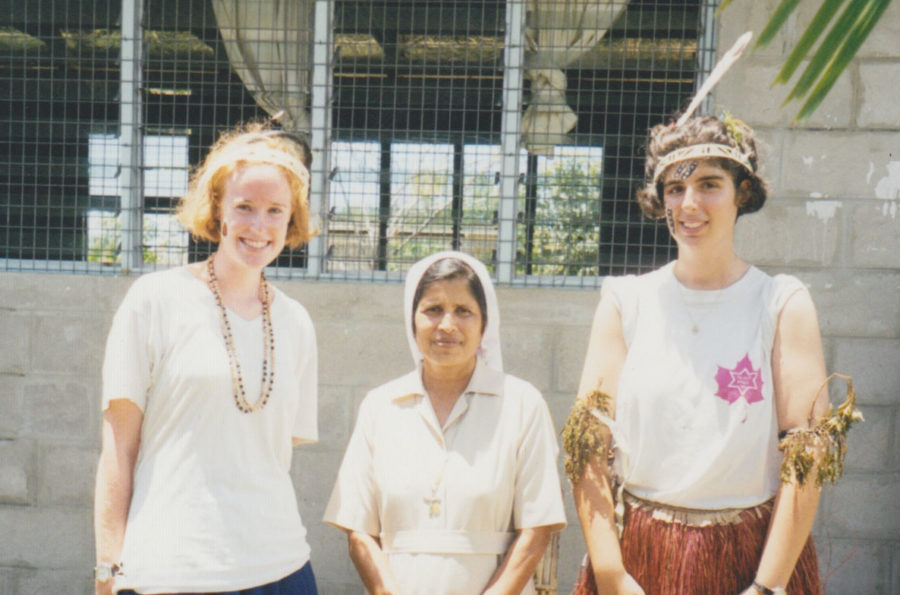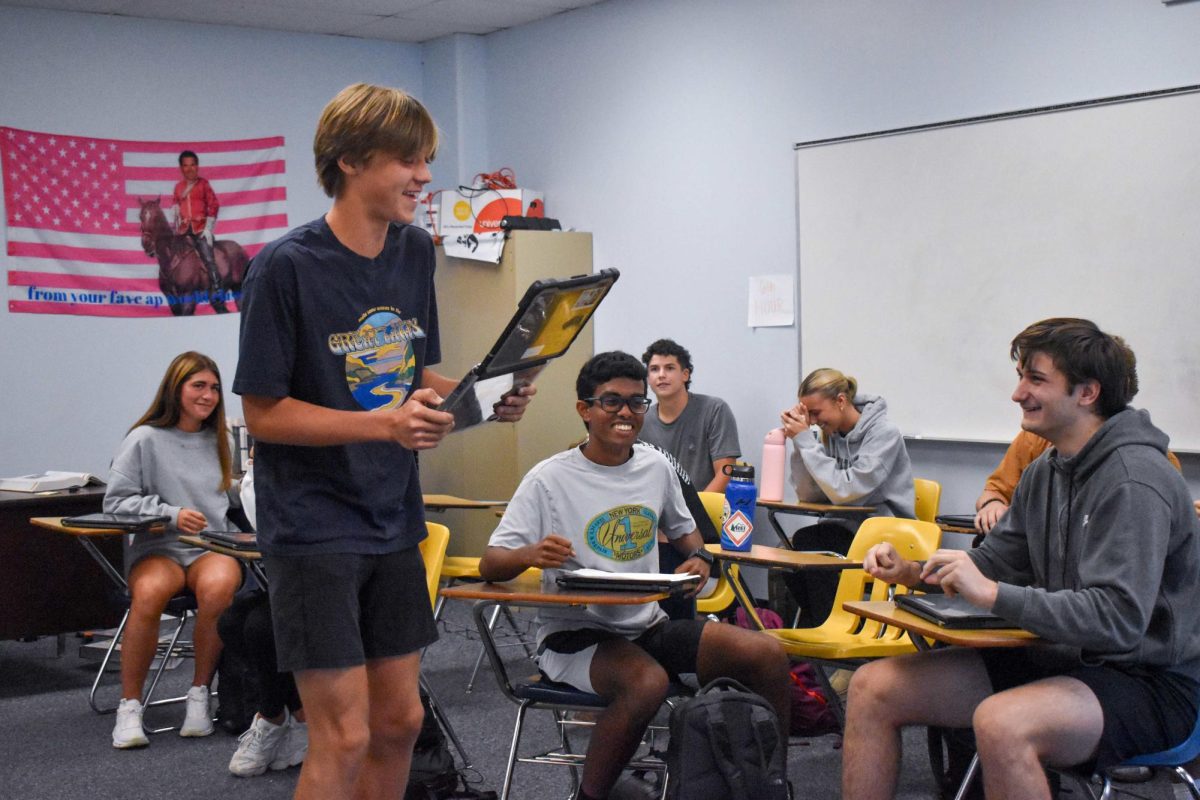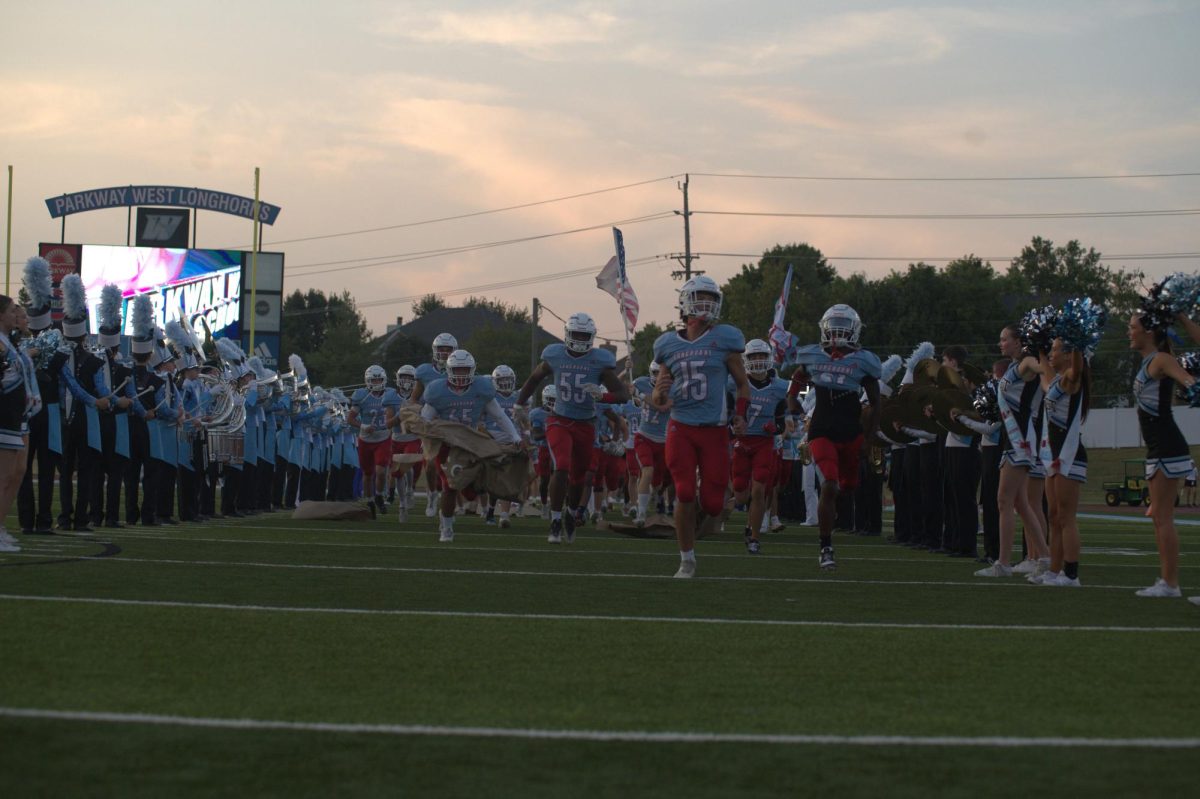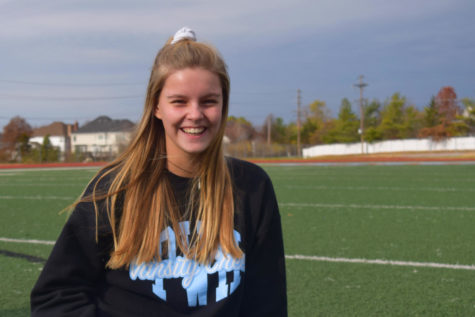Science Teacher Amy Cohen retells her adventures overseas before teaching at West.
After graduating from Drake University in 1997, science teacher Amy Cohen joined the Peace Corps and taught students in a developing country.
“I had already done some study abroad programs in both high school and college, and I loved the idea of being outside of the United States and being of service to others, as well as having an opportunity to really be invested in another culture and community,” Cohen said.
Cohen first traveled to Papua New Guinea, a country north of Australia, where she taught students on Goodenough Island.
“I learned a lot about myself in terms of how resilient I can be and how patient I should be. It was very rewarding for me to be able to be a role model for them. I also learned that no matter where you are in the world, people are people, and if you treat people with kindness, they’ll be kind to you,” Cohen said.
For two years, Cohen taught overseas while learning to adapt to life in a developing country.
“Lifestyle wise, it was challenging because we didn’t have consistent water or electricity. It was a very rural environment where there weren’t grocery stores, movie theaters or cars, so communication and transportation were challenging,” Cohen said. “In terms of my job, it was challenging having the male teachers see me as an equal since men were valued more than women in New Guinea, and me being able to have a voice in what I thought was best for our students.”
Cohen and other volunteers had to fetch and boil water, cook food from scratch, wash clothes by hand and garden to get food.
“Usually, we would have electricity from six to 10 at night. We’d wait to hear the generator come on to know that we had electricity, so then it would be easier to cook dinner. When the power went off, we made sure to be in our beds before the lights went out. It was the best sleep I have ever had because we had to be in bed before 10,” Cohen said.
Over the course of two years, Cohen taught science, math and expressive arts, a course similar to fine arts. Cohen was also the choir director, helped run the library and at one point, was also the basketball coach.
“It gave me a different perspective on teaching and interacting with students. It’s very different because they had no supplies, and there were no computers. The act of teaching was different, but the opportunity to try to figure out how to make connections with students is still the same, no matter what grade or subject you teach,” Cohen said.
Cohen had traveled before serving in the Peace Corps, more for recreational purposes than service, but did not realize the severity of a developing country and their living conditions before experiencing it firsthand.
“It really helped me appreciate what I have here in the United States, such as having 24-hour access to food, electricity, safe water, safe roads and doctors, having the right to vote and having the ability to go to school without paying tuition,” Cohen said. “People don’t realize how good it can be in America compared to other places.”
Between being white and a woman, Cohen was able to empathize with those who are marginalized in the community where they live because she too had been apart of the minority group.
“It was like two strikes against me since I was a white female, and it really helped me see how some people feel when they are marginalized in the community where they live. There’s challenges of course, but always something to value from interacting with people from other countries and cultures. There’s a lot to gain from diversity,” Cohen said.

After two years of serving in New Guinea, Cohen participated in the AmeriCorps program and voluntarily taught at Fanning Middle School in the City of Lanzhou. For one year, she taught English as a Secondary Language to students whose families were refugees. Cohen decided to stay in St. Louis and began her career at Parkway West and while attending Maryville’s graduate school program.
“Everyone has their own path, but for me, doing the Peace Corps, AmeriCorps and staying involved internationally have all helped me feel much more well-rounded as a teacher. It’s not always about science—it’s just about education and providing opportunities for students to learn,” Cohen said.




![Freshman Daphne Stokes looks at a table with Veterans Day flyers and information on Nov. 11. Stokes, along with other West High students, like senior Alexander Lewinski, passed by the table in the cafeteria with army recruitment information and giveaways for students to observe during lunch. “Talking with [the recruiters] has definitely helped me [find] where I wanted to go, more than anything else,” Lewinski said.](https://pwestpathfinder.com/wp-content/uploads/2025/11/DSC_1227-2-1200x800.jpg)
![Helping a customer, print room assistant Gretchen Williams operates her booth at the West High Craft Fair from Oct. 25-26. This was Williams’ first time participating in the Craft Fair with her new craft shop, Gs Beaded Boutique. “People have always said, over the years, ‘you should open something.’ [I replied that] I would rather just make [my crafts as] gifts for people. I just started [the online store] up, and it's been okay. I'm always surprised [by] how many views I get and [the] people from different states buying things; somebody from Alaska bought something the other day.”](https://pwestpathfinder.com/wp-content/uploads/2025/11/DSC0451-2-1200x799.jpg)
![Gesturing toward the club’s name on the board, Global Youth Aid co-president year Daniah Alsagheer discusses upcoming service projects with members during a meeting on Oct. 30. “We might be one club at one school, but together, we’re [part of] something much bigger,” Alsagheer said.](https://pwestpathfinder.com/wp-content/uploads/2025/11/DSC00949-1200x800.jpg)
![Focused on providing exceptional service, sophomore Darsh Mahapatra carefully cleans the door of a customer’s car. Mahapatra has always believed his customers deserve nothing less than the best. “[If] they’re trusting us with their car and our service, then I am convinced that they deserve our 100 percent effort and beyond,” Mahapatra said.](https://pwestpathfinder.com/wp-content/uploads/2025/10/DSC_0018-1200x800.jpg)
![Sophomore Aleix Pi de Cabanyes Navarro (left) finishes up a soccer game while junior Ava Muench (right) warms up for cross country practice. The two came to Parkway West High School as exchange students for the 2025-2026 school year. “The goal for the [exchange] program is to provide opportunities for both Parkway students and our international exchange students to learn about other cultures, build connections and become confident, capable, curious and caring — Parkway’s Four C’s — in the process,” Exchange Program Lead Lauren Farrelly said.](https://pwestpathfinder.com/wp-content/uploads/2025/10/Feature-Photo-1200x800.png)

![Gazing across the stage, sophomore Alexis Monteleone performs in the school theater. The Monteleone family’s band “Monte and the Machine” has been releasing music since 2012, but Alexis started her own solo career in 2024 with the release of her first single, Crying Skies. “My whole family is very musical, [and I especially] love writing [songs with them],” Monteleone said.](https://pwestpathfinder.com/wp-content/uploads/2025/09/DSC7463-1200x798.jpg)
![Amid teaching a lesson to her AP Calculus BC class, Kristin Judd jokes alongside her students in their funny remarks. Judd has always enjoyed keeping the mood light in her classroom, along with on the volleyball court. “[I enjoy] that side talk where you see [or] overhear a conversation and chime in, or somebody says something funny,” Judd said.](https://pwestpathfinder.com/wp-content/uploads/2025/09/image-1200x730.jpg)
![Eyeing the ball, junior Ella McNeal poses for her commitment pictures at Clemson University. McNeal’s commitment comes after months of contact with top Division 1 soccer programs. “ It has taken a lot to get to where I am, but I know that [what] I've already been through is just the beginning, and I can't wait for what is to come,” McNeal said.](https://pwestpathfinder.com/wp-content/uploads/2025/09/IMG_4926-1200x900.jpeg)

![Sophomore Shree Sikkal Kumar serves the ball across the court in a match against Lindbergh. Sikkal Kumar has been a varsity member of the varsity girls’ tennis team for two years, helping her earn the number two rank in Class 2 District 2.“When matches are close, it’s easy to get nervous, but I [ground] myself by[staying] confident and ready to play,” Sikkal Kumar said.](https://pwestpathfinder.com/wp-content/uploads/2025/11/DSC2801-1200x798.jpg)
![Dressed up as the varsity girls’ tennis coach Katelyn Arenos, senior Kate Johnson and junior Mireya David hand out candy at West High’s annual trunk or treat event. This year, the trunk or treat was moved inside as a result of adverse weather. “As a senior, I care less about Halloween now. Teachers will bring their kids and families [to West’s Trunk or Treat], but there were fewer [this year] because they just thought it was canceled [due to the] rain. [With] Halloween, I think you care less the older you get,” Johnson said.](https://pwestpathfinder.com/wp-content/uploads/2025/10/DSC00892-1-1200x800.jpg)
![Leaning on the podium, superintendent Melissa Schneider speaks to Parkway journalism students during a press conference. Schneider joined Parkway in July after working in the Thompson School District in Colorado. “My plan [to bond with students] is to get things on my calendar as much as possible. For example, being in [classes] is very special to me. I am trying to be opportunistic [meeting] kids [and] being in [the school] buildings. I have all the sports schedules and the fine arts schedules on my calendar, so that when I'm available, I can get to them,” Schneider said.](https://pwestpathfinder.com/wp-content/uploads/2025/09/IMG_5425-1200x943.jpeg)

![Leaping through the air, senior Tyler Watts celebrates his first goal of the season, which put the Longhorns up 1-0 against the Lafayette Lancers. Watts decided to play soccer for West for his last year of high school and secured a spot on the varsity roster. “[Playing soccer for West] is something I had always dreamed of, but hadn’t really had a good opportunity to do until now. It’s [really] fun being out [on the field], and I’m glad I decided to join the team. It’s just all about having fun with the boys and enjoying what time we have left together,” Watts said.](https://pwestpathfinder.com/wp-content/uploads/2025/09/DSC_1951-1200x855.jpg)

![Shifting global trade, President Donald Trump’s tariffs are raising concerns about economic stability for the U.S. and other countries alike. “[The tariffs are] going to pose a distinct challenge to the U.S. economy and a challenge to the global economy on the whole because it's going to greatly upset who trades with who and where resources and products are going to come from,” social studies teacher Melvin Trotier said.](https://pwestpathfinder.com/wp-content/uploads/2025/05/MDB_3456-1200x800.jpg)

![Pitching the ball on Apr. 14, senior Henry Wild and his team play against Belleville East. Wild was named scholar athlete of the year by St. Louis Post-Dispatch after maintaining a high cumulative GPA and staying involved with athletics for all of high school. “It’s an amazing honor. I feel very blessed to have the opportunity to represent my school [and] what [it] stands for,” Wild said.](https://pwestpathfinder.com/wp-content/uploads/2025/05/unnamed-6-1200x714.jpg)
